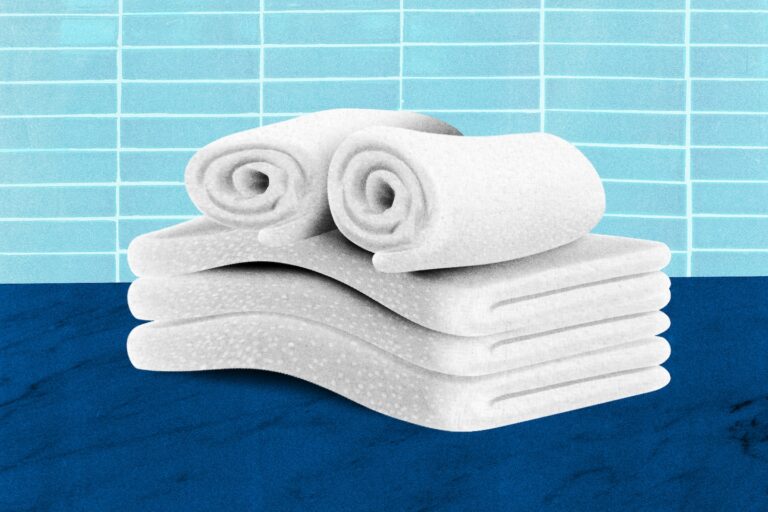“If I have to spend another $50,000 at the end of the year replacing the towels just to keep them clean, I’m OK with that,” said Fox, the restaurateur who opened the luxury hotel last December.
While the linen closet isn’t usually the only reason travelers book a hotel, towels are. Online reviews often praise hotels for their thick, luxurious towels. But even more hotels seem to be letting guests down by rating their towels as “frayed,” “worn,” or “thin.”
In Hilton surveys conducted in 2022 and 2023, towels were ranked as the most common request made to the front desk, with guests citing towel quality and quantity. The company responded by conducting a six-month product review involving nearly 60 vendors and washing test towels at least 120 times. After completing the survey, Hilton began rolling out 40 million new towels and noticed an increase in guest satisfaction.
“This particular product has a fabric that stretches after washing,” said Anu Saxena, global head of supply management for Hilton, which serves more than 17,000 properties around the world, “so the towel feels softer and fluffier.”
While some hotels are making progress, many budget and mid-range hotel towels are still as rough as a cat’s tongue. Here’s what’s happening with hotel towels today and what’s next.
Not all hotel towels are the same
Towels may look simple, but they’re complex in design and construction. Quality is determined by factors such as thread type and thickness, loop length and density, and tensile strength, says Judson Uhle, a hotel investment adviser and certified master hotel supplier for supply company Hotels for Humanity. The best towels are made from 100% cotton, such as Egyptian or Pima, and have a grams per square meter (GSM) rating of 500 or higher, which measures the towel’s thickness, he says.
To save money, many properties prefer blends, such as cotton-polyester mid-weaves, and also opt for styles with a lower GSM. Lighter towels dry faster and can withstand frequent cycles in the washer and dryer, but they sacrifice softness and weight for added durability.
“Basic hotels have shorter stays than luxury hotels, so they need to wash towels more frequently,” says Julien Durand, co-founder of Luxury Hospitality Consulting. Washing larger towels also comes at a cost, an expense that standard hotels can’t easily afford.
How towels deteriorate
Most hotels can use towels 50 to 100 times before throwing them out, says Greg Eubanks, group vice president at Standard Textile, which stocks towels in thousands of hotels around the world, adding that the average hotel replaces about 60 percent of its inventory each year.
“They’re either lost, mysteriously disappeared or are dirty, torn or ripped,” Eubanks said.
Excessive washing can damage towels. Chemical cleaners and high temperatures eat away at the fibers and make towels scratchy. Hard water can also damage towels, as can the bleach that keeps hotel towels snow-white.
“A hotel laundry is not like a Maytag at home,” Eubanks says. “The rigors of a hotel laundry are much more demanding, the environment is harsher, the chemicals are harsher, so we have to develop towels that are durable.”
Why you shouldn’t mix towels
Every towel in a hotel has a place and purpose. Because of this division of roles, hotels often ask guests not to take towels from their rooms or steal them from the pool or spa. Even if towels look similar, housekeeping staff can easily tell them apart.
Towels in guest rooms are usually white to represent cleanliness, and come in a variety of sizes: washcloths, hand towels, bath towels (or “sheets”), etc. Hotels avoid brightly colored towels as they may fade.
Pool and beach towels, on the other hand, come in one size (large) and are often colorful, so they stand out on sun decks and laundry rooms. They’re made from durable materials to withstand sunscreen, chlorinated pool water and other outdoor elements. Eubanks says his company uses solution-dyed yarn in its pool towels to act as a shield against chlorine.
Spa towels, which double as robes, are more luxurious than your average towel. They’re also more durable, meaning they can withstand the stresses of the job, including the essential oils, creams, and other agents often used in massages and other treatments.
The Biodegradable Future of Hotel Towels
Towels are evolving in line with the hospitality industry’s efforts to minimize waste and embrace environmentally friendly practices, as manufacturers experiment with innovative blends incorporating fibers from bamboo and beech trees, which require less water than cotton production. Recycled beverage bottles or plastic.
“Sustainability is definitely a top priority in terms of materials, recycled content, manufacturing processes and, of course, durability,” said Jean Varney, senior lecturer at Cornell University’s Nolan School of Hotel Administration.
Eubanks said Standard Textile is testing microfilament technology to make towels more durable, and hopes to eventually incorporate synthetic materials that can easily decompose, eliminating waste.
“Cotton is more sustainable than polyester because it’s biodegradable, but biodegradable polyester is the future of hospitality towels,” Eubanks said.
For now, hotels are getting more creative with their towels’ next life once they’re no longer usable. Instead of taking old towels to the landfill, some are reusing them as cleaning rags or distributing them to homeless shelters, orphanages, and other charity centers. Earlier this year, Hilton announced it would donate more than 100,000 towels and other terry products to hundreds of animal shelters across North America. The hand-me-down towels will become bedding for up to 70,000 animals.
That’s exactly what hotels should strive to do, says Barney: “Don’t throw it away. Keep it in the flow of its life cycle.”


